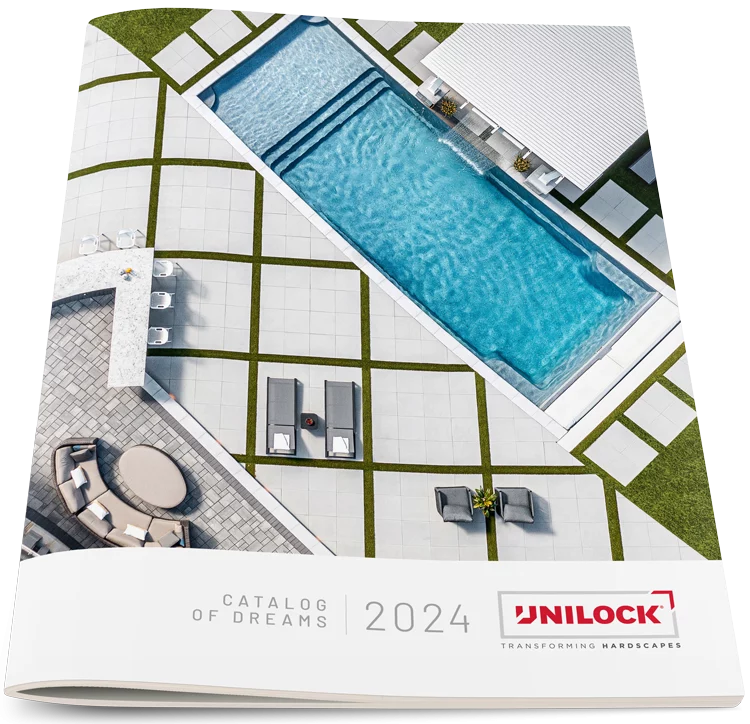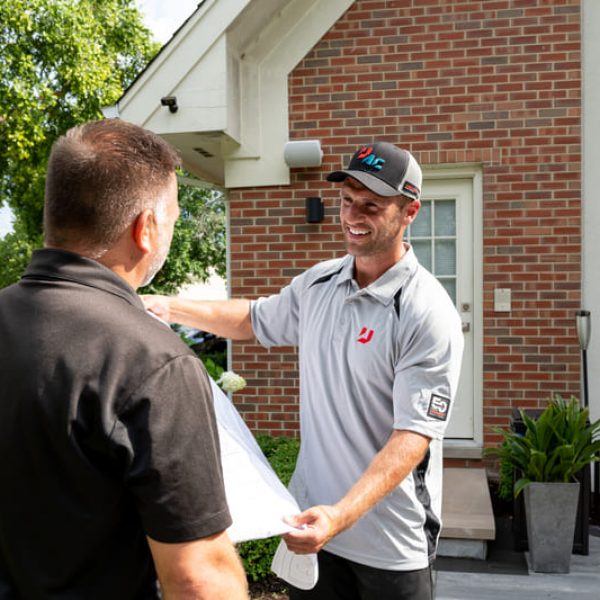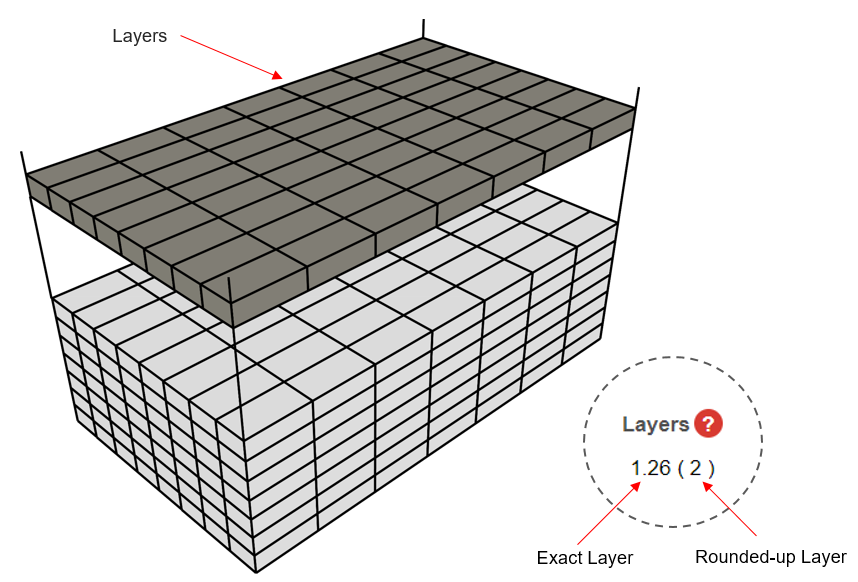Working with a Unilock Authorized Contractor is working with the best of the best. Our UACs possess the knowledge and expertise to bring your dream project to life, and deliver stunning results that will exceed your expectations.
How to Clean Pavers: Expert Tips for Paver Cleaning
Unilock pavers are designed to look pristine for years, but the changing of the seasons, general wear and tear, and organic stains and spills can leave unsightly blemishes that may impact the look of your pavers. Keeping your outdoor space looking its best doesn’t have to be a daunting task. In this guide, we’ll walk you through a few simple, practical solutions for cleaning your pavers, no matter the season.
Step-by-Step Guide to Basic Paver Cleaning
A regular cleaning routine should be part of your maintenance plan, ranging from simply sweeping or blowing loose debris from the pavement surface to less frequent deep cleaning with cleaning products and/or water. Here are 6 simple steps to clean your paved surface:
Step 1: Inspect the surface for any cracked or broken pavers and replace them if needed.
Step 2: Pull back or protect nearby plants from over-spray, if using a cleaning solution to clean your pavers.
Step 3: Be sure to wear protective equipment, including goggles and rubber gloves, when handling and using cleaning solutions.
Step 4: Spray water on the surface using a hose or power washer at an angle no greater than 30 degrees, to avoid washing out any joint material.
Step 5: Thoroughly rinse off cleaning solutions from the surface, directing water to suitable drainage points.
Step 6: Inspect the joints and sweep in new joint material if necessary.
Let’s delve into how to effectively tackle common stains on your paved surface.
How To Clean Organic Stains off Patio Pavers and Paving Stones
Patio pavers and paving stones add charm to outdoor living areas, but they’re prone to organic stains, such as dirt, grime, algae, and tannins from trees. To keep them looking fresh, gently scrub your pavers with a mixture of soap and water or a specialized paver cleaning solution. Avoid harsh chemicals that can damage the pavers and opt for a soft-bristled brush for stubborn spots. Do not use a wire brush, as the bristles may damage the surface and leave metal particles behind, which can result in rust staining. Once the area has been scrubbed, rinse the area clean with a hose or a pressure washer on a low setting.
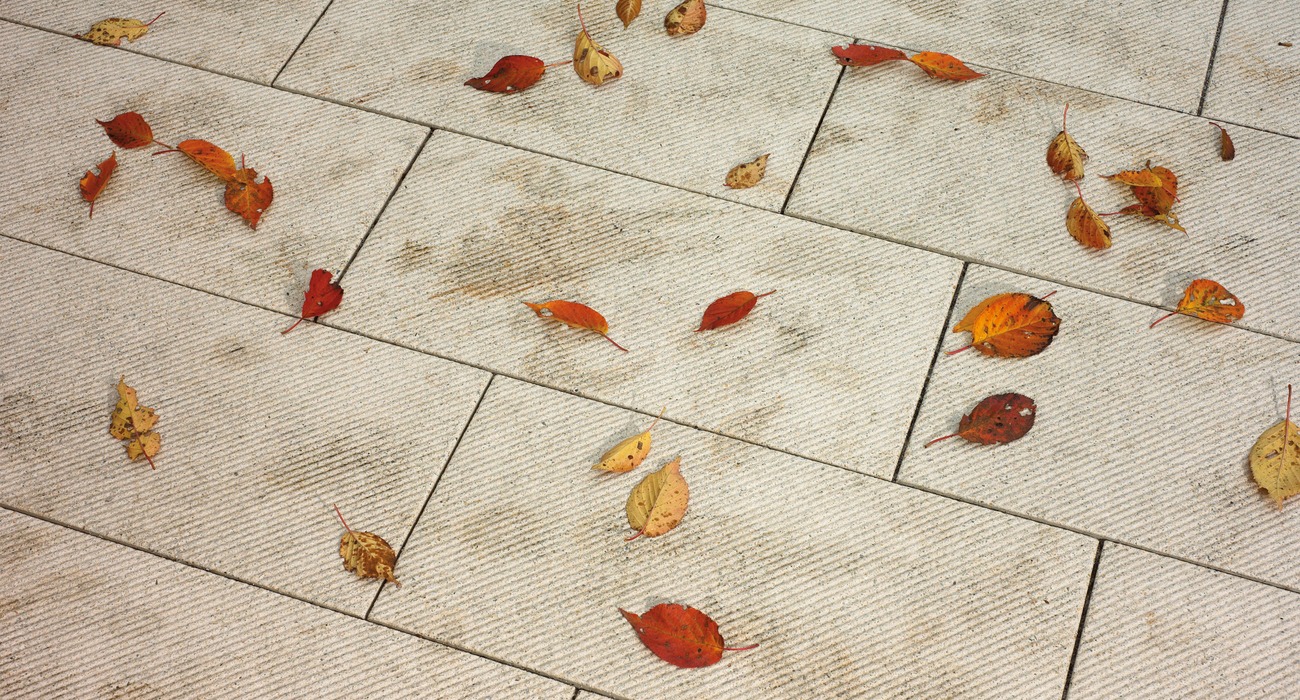
How To Clean Efflorescence off Concrete and Cement Pavers
Efflorescence is a naturally occurring phenomenon that sometimes occurs after the completion of a paver or wall installation.
It’s a powdery, white mineral deposit made of calcium and other minerals found in some quarried gravels and sands. Over time, it can move to the surface of concrete when it gets wet and dries repeatedly. In most cases, efflorescence is temporary and will dissipate on its own. However, if you wish to remove efflorescence quicker, consider using a specialized efflorescence remover, which is designed to dissolve efflorescence and remove dirt and debris without discoloring your pavers. Apply the cleaner according to the manufacturer’s instructions, otherwise, you can use regular dish soap and water combined with a stiff plastic scrub brush to clean the efflorescence.

How to Clean Food and Wine Spills from Your Paver Patio
Summer barbecues can be messy affairs, especially when ketchup, mustard, barbecue sauce, or wine ends up on your paver patio. Fortunately, cleaning them up is easier than you might think. Start by blotting any excess liquid with paper towels to prevent it from seeping deeper into the pavers. Then, gently scrub the affected area with a mixture of soap and water. For particularly stubborn stains, you may want to try a specialized cleaner designed for outdoor surfaces or a mild detergent solution. Alternatively, you can opt for a pre-sealed paver, like EasyClean™, which protects the surface from staining by making spills easier to clean.
How to Clean Oil Stains off Driveway Pavers
Driveway pavers endure heavy traffic and are prone to oil stains. To tackle these stains effectively, start by soaking up the oil with a paper towel or using kitty litter. Once the majority of the spill has been absorbed, clean the pavers with a gentle solution of soap and water, or opt for a specialized driveway paver cleaner. Additionally, consider sealing your driveway pavers immediately after installation, once they’ve been thoroughly cleaned and dried. This will help in maintaining their appearance and color for longer, while also preventing the penetration of spills.
How To Clean Mold and Mildew off Concrete Pavers
Mold and mildew are common issues to resolve, particularly if your paver patio is exposed to regular moisture or constant shade. Cleaning your pavers can be done effectively with a gentle solution of water and mild detergent or using a specialized paver cleaner. Another alternative is white distilled vinegar, which is excellent for killing mold. While it may have a strong odor, vinegar doesn’t carry the same toxic properties as bleach. Simply pour vinegar directly onto the mold or mildew spots and let it sit for 10-15 minutes before rinsing it off with water. Vinegar is also effective at killing weeds on your paved surface as well.
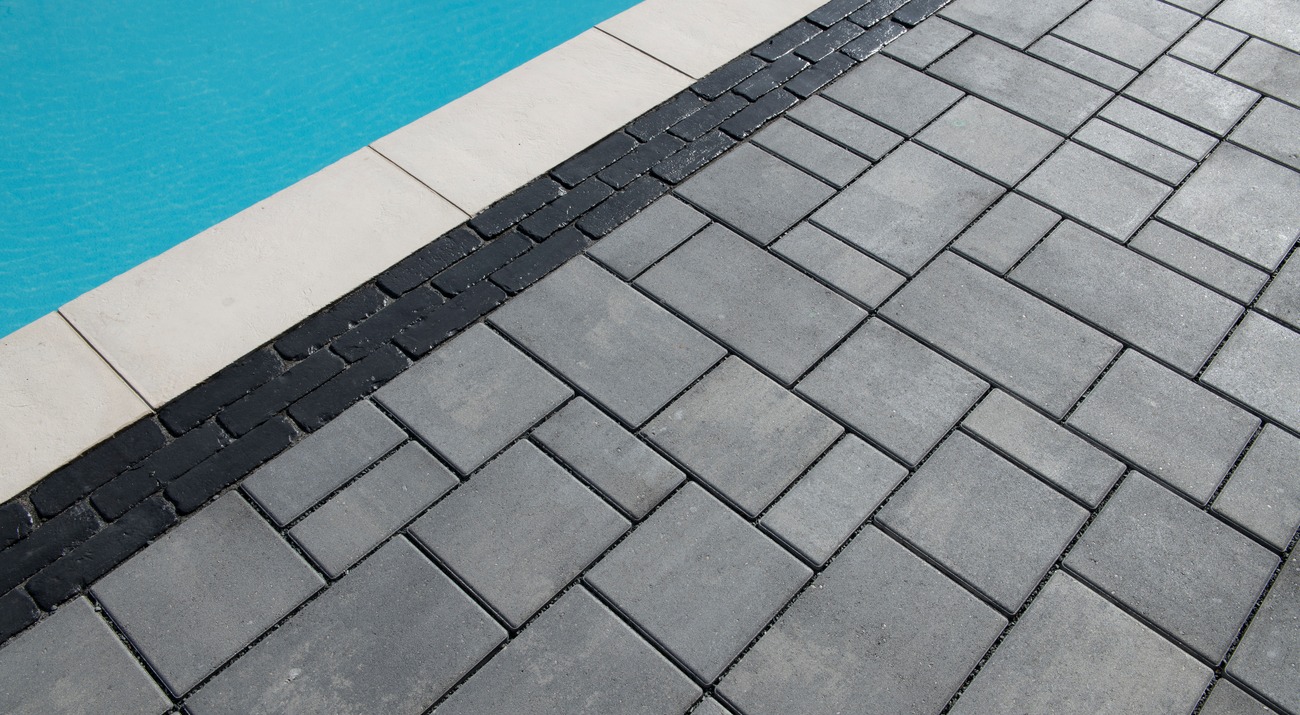
Different Methods and Solutions for Paver Cleaning
Before you tackle whatever spill or stain is affecting your paver patio, driveway, or any other application, let’s explore the different methods or solutions you can use for paver cleaning. We will look at the pros and cons of using specialized paver cleaners, versus opting for pressure washing your pavers.
Specialized Paver Cleaners
Pros:
- Tailored Formulation: These cleaners are designed specifically for different pavers and cleaning needs, ensuring they work effectively.
- Clear Instructions: You’ll find detailed usage instructions from manufacturers, making them easy to use.
Cons:
- Higher Cost: Specialized cleaners might be pricier than DIY solutions.
- Availability: Finding the right cleaner for your specific pavers may take some research or shopping around.
Pressure Washing Pavers
Pros:
- Powerful Cleaning: Pressure washing can effectively remove stubborn stains and debris.
- Timesaving: Pressure washing is a quick way to clean large areas more efficiently.
Cons:
- Risk of Damage: Improper pressure or nozzle settings can harm paver surfaces, causing cracks or erosion, or potentially blowing out joint sand from crevices of pavers.
- Cost: Professional pressure washing can be expensive, particularly for larger areas or frequent cleanings.
- Environmental Impact: Pressure washing may contribute to water wastage and runoff, raising environmental concerns. For instance, paver driveways may harbor various harmful pollutants, including vehicle fluids like antifreeze, brake fluid, and oil residue, as well as pet waste from fecal matter, de-icing salts, pesticides, and other contaminants.
Soap and Water Solution for Paver Cleaning
Pros:
- Readily Available: Soap and water are readily available household items, making them convenient for regular maintenance.
- Versatility: Soap and water can effectively remove a wide range of stains, including organic stains like dirt, grime, and mildew.
- No Residue: Properly rinsing after cleaning ensures no residue is left behind, leaving your pavers looking clean and fresh.
Cons:
- Limited Effectiveness: Soap and water may not be sufficient for tackling stubborn or deep-seated stains, requiring additional cleaning agents or methods.
- Time-Consuming: Cleaning large areas with soap and water can be time-consuming, especially for heavily soiled surfaces.
- Requires Scrubbing: Stubborn stains may require vigorous scrubbing, which can be labor-intensive and may not always yield the desired results.
Prevent Stain Penetration with EasyClean Technology
Paving products feature fine capillaries capable of trapping dirt, liquids, and various substances, including ketchup, mustard, coffee, wine, motor oil, as well as organic stains like leaves, dirt, and algae. If left unattended, these substances can penetrate the paver, making them challenging to clean and leaving behind stubborn stains. Fortunately, Unilock offers a solution with a line of pavers factory-sealed with our proprietary sealant.
EasyClean™ technology represents a breakthrough in paver sealants. Infused into the paver at the factory level, this specially developed sealant provides comprehensive resistance to staining from top to bottom, slowing stains from penetrating the paver. By choosing EasyClean, you ensure easier cleanup of spills before a stain takes hold. Plus, you can skip the hassle of applying an after-market sealer, as the deep stain resistance of EasyClean is guaranteed as part of the product.
Some of our most popular EasyClean™ paver products include Umbriano™, Arcana™, Town Hall®, and more.
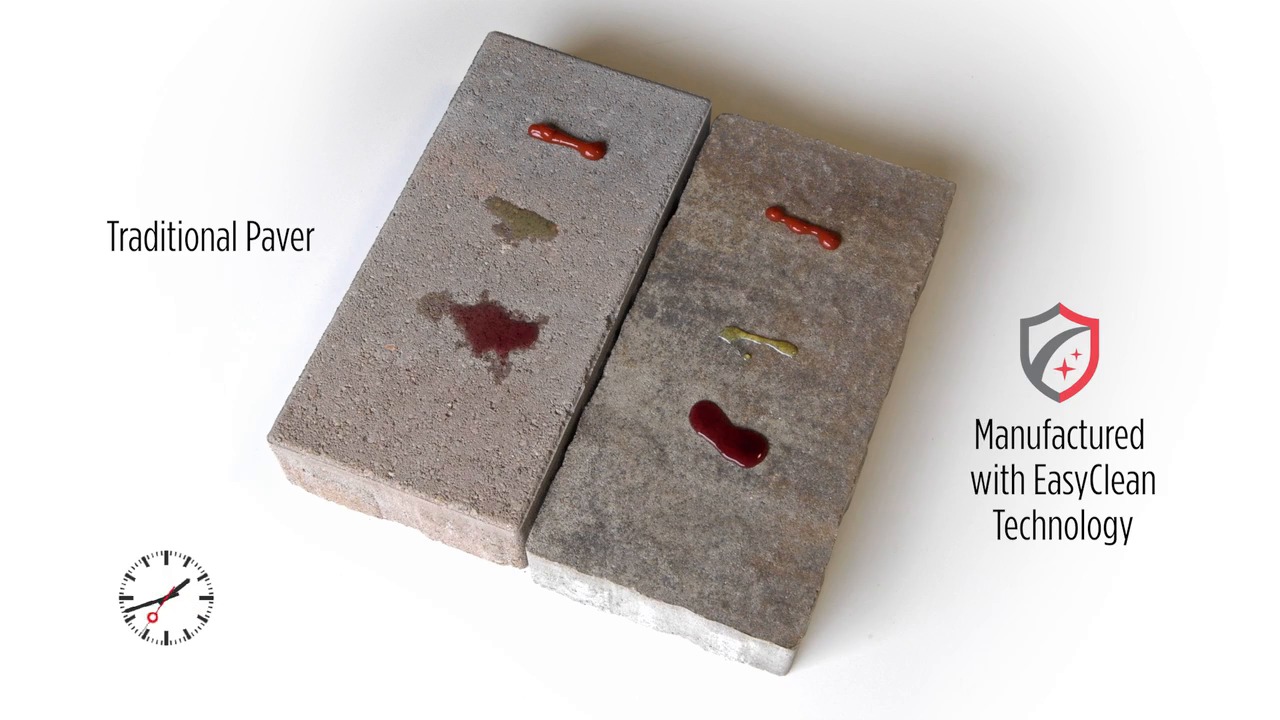
With the right approach and care, you can keep them looking their best for years to come. By following these practical cleaning methods and solutions, you can continue to preserve the natural beauty and durability of your pavers for years.
Related
Articles

We’re Here
To Help
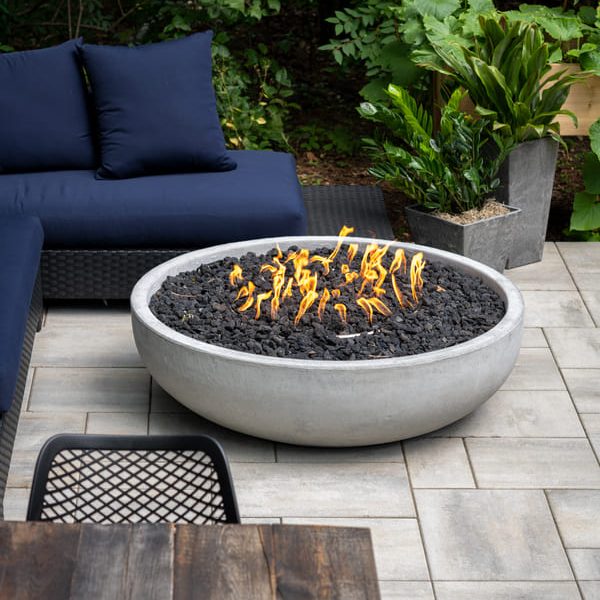
Browse our Design Idea Catalog
Explore endless design possibilities through our Design Idea Catalog. Browse our extensive portfolio of paver and wall products, and get inspired by our outstanding design projects that will fuel your creative expression.

Visit an Outdoor Idea Center
Experience the beauty and quality of Unilock paver and wall products in a life-sized setting by visiting a local Outdoor Idea Center. Our knowledgeable and friendly staff are on hand to answer any questions and offer free product samples.
